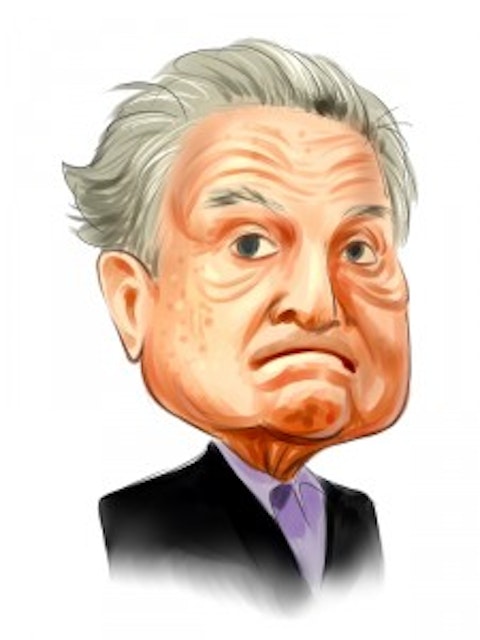
Gordman’s Stores, Inc. (NASDAQ:GMAN)
Gordman’s Stores is an “everyday value” department store chain, featuring a large selection of the latest brands, fashions and styles. With discounts up to 60% off in many sections of its stores, Gordman’s focus is to provide customers with an easy-to-shop environment at affordable prices. Now, Gordman’s is just beginning to get its wheels turning, so to speak, and is currently not as recognizable as competitors like TJ Maxx (NYSE:TJX) and Kohl’s (NYSE:KSS). With the lowest leasing cost structure and the cheapest cost per square feet, Gordman’s is headed in the right direction.
Between the first and second quarters of 2012, hedge funds increased their collective positions in the discount clothing retailer by 651%. In total, the number of funds long Gordman’s increased from two to five. Magnetar Capital, headed by Alec Litowitz and Ross Laser, is the most bullish of the group, owning 150,000 shares worth a little over $2.6 million.
From a valuation standpoint, Gordman’s is trading at 13.2 times its earnings, which is below the apparel industry’s average of 22.0. Moreover, the stock sports a PEG ratio of 0.7; typically any figure below 1.0 signals an undervaluation.
If discount retailers can continue to benefit from the sluggish economic recovery, which pushes shoppers to look for bargains, we expect more hedge funds to take notice of Gordman’s in the third quarter. To learn more about how discount clothing retailers are benefitting from economic uncertainty, click here.
Green Dot Corporation (NYSE:GDOT)
Green Dot Corporation is a leading prepaid financial solutions company providing reloadable prepaid debit cards to U.S. customers. Between the first and second quarters of this year, hedge funds increased their positions in the stock by 102%. The most prominent managers that are long Green Dot include George Soros, Brian Taylor, and Joel Greenblatt. In Soros’ case, he reported holding Green Dot shares for the first time in June 2012 (See Soros long term stock picks).
Now, one conviction that is shared by many Green Dot bulls is that an increasing number of unbankable/underbanked U.S. customers will eventually turn to prepaid cards as the source of funding for their shopping endeavors. The company itself has a strong balance sheet and many opportunities for growth, but its stock price has taken quite the plunge in recent months, falling 42.6% since July 26th.
On this date, management lowered its year-end estimates for 2012, while a class action lawsuit was filed by shareholders who purchased the stock between January 26, 2012 and July 26, 2012. According to court documents, the suit claims that Green Dot issued “materially false and misleading” statements to shareholders. Specific concerns were over the company’s revenue outlook going forward, and it’s cloudy relationship with third-party retailers.
Since bottoming out at the end the July, the company’s stock has recovered slightly, and is currently trading in the $12 range. Green Dot is valued at 13.4 times its earnings, just over half of the 26.2 times earnings they traded at in 2011.
Arch Coal Inc (NYSE:ACI)
Arch Coal, Inc. is a leading United States coal producer. In 2011, the Company sold approximately 156.9 million tons of coal, including 5.5 million tons it purchased from third parties, representing roughly 14% of the U.S. coal supply.
Between the first and second quarters of 2012, hedge funds increased their positions in the stock by 56%. Arch Coal’s largest bull, Renaissance Technologies, and its second largest bull, Citadel Investment Group, helped fuel this second quarter increase. Specifically, Citadel nearly doubled its holdings of Arch Coal to 2.3 million shares worth over $16.3 million, while Renaissance established a $25.5 million position in the coal producer.
Year to date, Arch Coal’s stock price has decreased more than 55%, as weak coal prices have wreaked havoc on the industry as a whole. This bearish macroeconomic environment is a result of a number of factors, including less than ideal demand, low natural gas prices, and uncertainty surrounding the federal government’s regulation of carbon dioxide emissions.
Most likely, hedge funds have demonstrated a stronger conviction in Arch Coal because it represents the possibility of a value play. Although the American and European economies have seen better days, Arch Coal may have the opportunity to export its products to a stronger, albeit idling, Asian demand. At its current price level, Arch Coal is cheap, trading at multiples of 0.3 times its sales and 0.5 times its book value.
Coinstar (NASDAQ:CSTR)
Coinstar is a provider of automated retail machines whose services started through its Coinstar kiosks, before expanding to the DVD rental market with its Redbox line. Redbox has over 35,000 kiosks at major retailers within 5 miles of 90% of the American population (which accounted for 88% of 2011 sales). The large portion of the company’s sales from its video segment forces it to be over-reliant on movie viewing trends.
Movie studios are threatening Coinstar’s top line growth, as many are extending the length of time between a movie’s public release and its release to the automated retail company. Growing trends in streaming movie services like Netflix and Hulu represent an additional risk, though it’s difficult to see exactly how Coinstar can stave off these concerns.
In an attempt to diversify its offering of automated machines, Coinstar has started a new kiosk venture in Rubi, a self-serve coffee kiosk. Between the first and second quarters of 2012, hedge funds increased their positions in the company by over 40%. Renaissance Technologies and Citadel are two of the top three Coinstar bulls. Renaissance nearly doubled its position in Coinstar, while Citadel increased its holdings by 293%.
Coinstar has been a volatile stock throughout the years, and hedge funds with strong convictions that DVD’s will remain an integral piece of front room entertainment may see a value play at its current price range of $52. Coinstar is trading at 10.5 times its earnings, which is below its 5-year historical average of 15.5.
Disclosure: I am long Gordman’s





